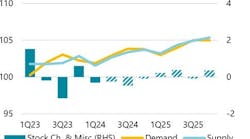The European Union (EU) agreed Dec. 2 to cap Russian seaborne oil prices to other destinations at $60/bbl. The deal was made after days of intense negotiations and just days before the EU’s Dec. 5 ban on itself receiving Russian seaborne crude most pipeline imports from the country.
The announcement comes after the G-7 group of advanced economies agreed earlier this year to cap prices on Russian seaborne crude in an effort to limit the country’s revenues (OGJ Online, Sept. 2, 2022).
The deal, which still needs to be approved by Poland, was confirmed on Twitter by European Commission President Ursula von der Leyen. “The EU agreement on an oil price cap, coordinated with G-7 and others, will reduce Russia’s revenues significantly. It will help us stabilize global energy prices, benefitting emerging economies around the world,” she said.
An EU document detailing the cap said the price limit’s effects would be regularly reviewed, but that prices should be held "at least 5% below” the market average.
The price cap is intended to be enforced by companies that provide shipping, insurance, and other services to Russian oil. If a buyer agrees to pay more than the cap, those companies will refuse to provide these services. Most of these companies are based in Europe or the UK.
Russia has warned of potential market chaos and higher prices as a result of the cap and said that it will not sell under its terms.
Some energy analysts have also warned that the cap is unlikely to be effective without support from other major buyers, such as China and India.
An EU ban on refined products from Russia is scheduled to go into effect Feb. 5, 2023.

